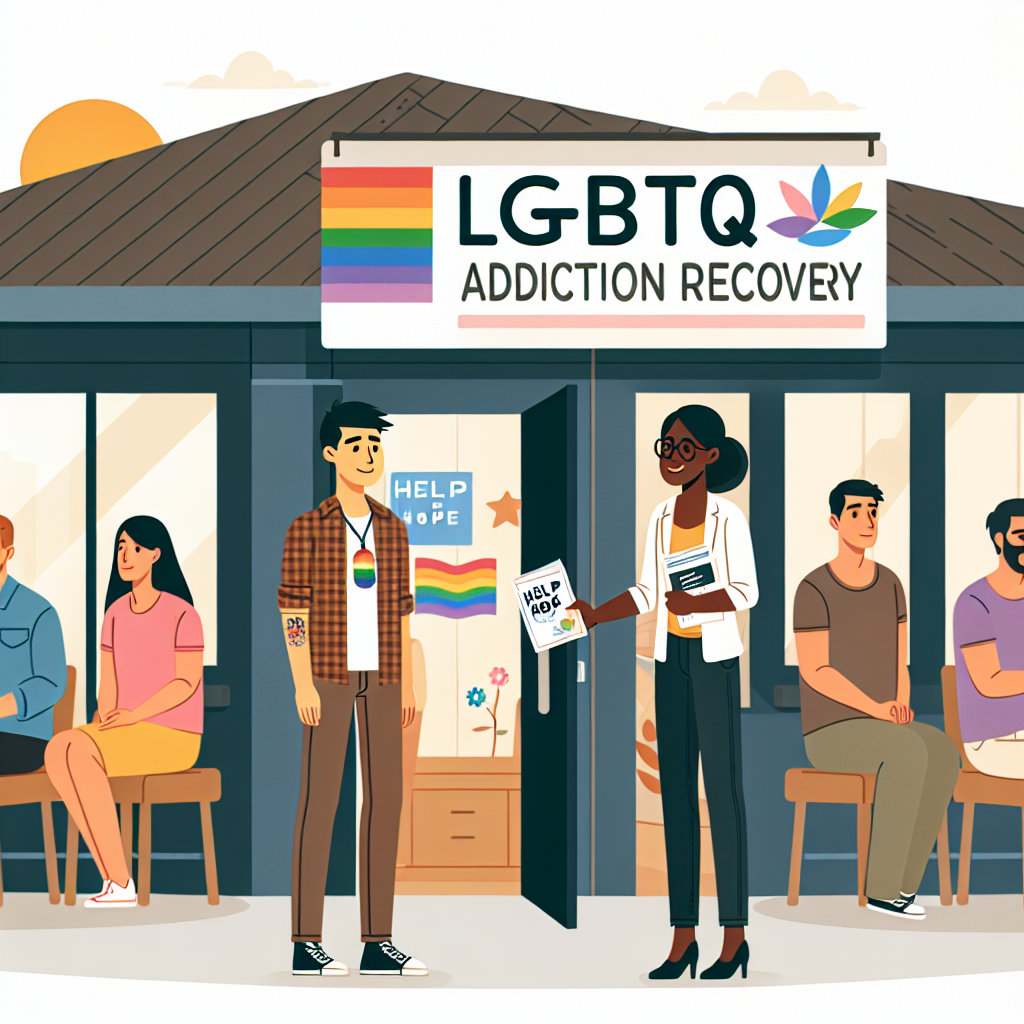-
Table of Contents

“Empowering LGBTQ+ Lives: Inclusive Addiction Recovery Services for All.”
Introduction
Addiction recovery services for LGBTQ+ individuals are specialized programs designed to address the unique challenges and needs faced by members of the LGBTQ+ community who are struggling with substance abuse. These services recognize that LGBTQ+ individuals often experience higher rates of addiction due to factors such as discrimination, social stigma, and mental health issues. Recovery programs tailored for LGBTQ+ individuals provide a safe and supportive environment where they can receive culturally competent care, including therapy, support groups, and medical treatment. These services aim to create an inclusive space that respects and understands the specific experiences of LGBTQ+ individuals, thereby enhancing the effectiveness of the recovery process.
Inclusive Addiction Recovery Programs Tailored for LGBTQ+ Individuals
Inclusive addiction recovery programs tailored for LGBTQ+ individuals are becoming increasingly recognized as essential components of comprehensive healthcare. The unique challenges faced by LGBTQ+ individuals in their journey toward recovery necessitate specialized services that address their specific needs. These tailored programs not only provide a safe and supportive environment but also foster a sense of community and understanding that is crucial for effective healing.
One of the primary reasons for the development of LGBTQ+-specific recovery services is the higher prevalence of substance abuse within this community. Studies have shown that LGBTQ+ individuals are more likely to experience substance use disorders compared to their heterosexual counterparts. This disparity can be attributed to a variety of factors, including societal stigma, discrimination, and the internalized stress that often accompanies a marginalized identity. Consequently, traditional recovery programs may not fully address the unique experiences and challenges faced by LGBTQ+ individuals, making specialized services a vital component of their recovery journey.
In response to this need, many addiction recovery centers have begun to offer programs specifically designed for LGBTQ+ individuals. These programs often incorporate a holistic approach, addressing not only the addiction itself but also the underlying issues that may contribute to substance abuse. For instance, therapy sessions may focus on topics such as coming out, dealing with family rejection, and navigating relationships within the LGBTQ+ community. By addressing these specific issues, recovery programs can provide a more comprehensive and effective treatment plan.
Moreover, inclusive recovery programs often employ staff who are either part of the LGBTQ+ community or have received extensive training in LGBTQ+ cultural competency. This ensures that the staff members are not only knowledgeable about the unique challenges faced by LGBTQ+ individuals but also empathetic and supportive. The presence of such staff can significantly enhance the comfort level of participants, making them more likely to engage fully in the recovery process.
Another critical aspect of LGBTQ+-specific recovery programs is the creation of a safe and affirming environment. Many LGBTQ+ individuals have experienced discrimination and rejection in various aspects of their lives, including healthcare settings. Therefore, it is essential for recovery programs to provide a space where participants feel accepted and valued for who they are. This sense of belonging can be incredibly empowering and can play a significant role in the recovery process.
Furthermore, these inclusive programs often emphasize the importance of building a supportive community. Group therapy sessions, peer support groups, and social activities are commonly incorporated into the treatment plan. These activities not only provide participants with a sense of camaraderie but also help them develop healthy relationships and coping mechanisms. The bonds formed within these groups can be a source of strength and encouragement, both during and after the recovery process.
In addition to the emotional and psychological support, LGBTQ+-specific recovery programs also address the physical aspects of addiction. Medical professionals who are knowledgeable about the unique health concerns of LGBTQ+ individuals are often involved in the treatment process. This ensures that participants receive comprehensive care that addresses all aspects of their well-being.
In conclusion, inclusive addiction recovery programs tailored for LGBTQ+ individuals are essential for addressing the unique challenges faced by this community. By providing a safe, supportive, and affirming environment, these programs can significantly enhance the effectiveness of the recovery process. The holistic approach, combined with the presence of knowledgeable and empathetic staff, ensures that participants receive the comprehensive care they need to achieve lasting recovery. As awareness of the importance of these specialized services continues to grow, it is hoped that more recovery centers will adopt inclusive practices, ultimately leading to better outcomes for LGBTQ+ individuals struggling with addiction.
Overcoming Addiction: Resources and Support for the LGBTQ+ Community
Overcoming addiction is a challenging journey for anyone, but for LGBTQ+ individuals, the path can be fraught with additional obstacles. The unique experiences and pressures faced by members of the LGBTQ+ community often necessitate specialized support and resources tailored to their specific needs. Fortunately, there are addiction recovery services designed to address these unique challenges, providing a beacon of hope for those seeking to reclaim their lives.
One of the primary reasons LGBTQ+ individuals may struggle with addiction at higher rates than their heterosexual counterparts is the pervasive discrimination and stigma they often encounter. This can lead to feelings of isolation, depression, and anxiety, which may drive some to seek solace in substances. Recognizing this, many recovery programs have been developed to create safe and affirming environments where LGBTQ+ individuals can feel understood and supported.
These specialized programs often incorporate a holistic approach to treatment, addressing not only the addiction itself but also the underlying issues that may contribute to substance use. For instance, therapy sessions may focus on coping mechanisms for dealing with discrimination, coming out, or navigating relationships within the LGBTQ+ community. By addressing these core issues, individuals are better equipped to maintain long-term sobriety.
Moreover, peer support plays a crucial role in the recovery process. LGBTQ+ individuals may find it particularly beneficial to connect with others who share similar experiences and challenges. Support groups specifically for LGBTQ+ individuals provide a space where members can openly discuss their struggles without fear of judgment. This sense of community and mutual understanding can be incredibly empowering, fostering a sense of belonging and reducing feelings of isolation.
In addition to peer support, many recovery services offer educational resources tailored to the LGBTQ+ community. These resources can include information on the intersection of substance use and sexual orientation or gender identity, as well as strategies for building a supportive network. By equipping individuals with knowledge and tools specific to their experiences, these programs help to demystify the recovery process and make it more accessible.
Furthermore, some recovery centers have staff who are trained in LGBTQ+ cultural competency. This means that counselors and therapists are not only knowledgeable about addiction but also sensitive to the unique needs and experiences of LGBTQ+ individuals. This specialized training ensures that clients receive care that is both effective and affirming, which can significantly enhance the recovery experience.
It is also worth noting that many LGBTQ+ recovery services recognize the importance of addressing co-occurring mental health issues. Given the higher prevalence of mental health disorders within the LGBTQ+ community, integrated treatment plans that address both addiction and mental health are often necessary. This comprehensive approach ensures that individuals receive the full spectrum of care needed to achieve and maintain sobriety.
In conclusion, while the journey to overcoming addiction can be particularly challenging for LGBTQ+ individuals, there are numerous resources and support systems available to help them succeed. By providing safe, affirming, and culturally competent care, these specialized services offer a lifeline to those in need. Through a combination of therapy, peer support, education, and comprehensive treatment plans, LGBTQ+ individuals can find the strength and resilience to overcome addiction and build a healthier, more fulfilling future.
Q&A
1. Are there addiction recovery services specifically tailored for LGBTQ+ individuals?
– Yes, there are addiction recovery services specifically tailored for LGBTQ+ individuals that address their unique needs and challenges.
2. What types of support do LGBTQ+ addiction recovery services typically offer?
– LGBTQ+ addiction recovery services typically offer individual and group therapy, support groups, medical detox, and counseling that is sensitive to the specific experiences and issues faced by LGBTQ+ individuals.
Conclusion
Yes, there are addiction recovery services specifically tailored for LGBTQ+ individuals. These services recognize the unique challenges faced by the LGBTQ+ community, such as discrimination, stigma, and higher rates of mental health issues, and provide specialized support to address these needs.



